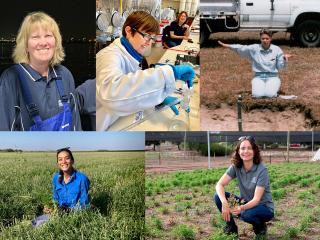The role of women at the Department of Primary Industries and Regional Development (DPIRD) is being celebrated as part of International Day of Women and Girls in Science 2023.
Women work in a broad range of scientific disciplines across DPIRD’s diverse portfolios, including veterinary science, aquatic science, biosecurity, agronomy, biometrics, natural resource management, genetics, entomology and more.
Department Director General Heather Brayford said DPIRD’s women epitomised this year’s themes: innovative, demonstrate, elevate and advance.
“Our staff – known for their expertise, passion and commitment – has a strong contingent of women who make an important contribution to advancing science and technology to grow and protect our primary industries and regions,” Ms Brayford said.
There are a number of diverse career paths in DPIRD, which span the department’s functions in the important areas of sustainability and biosecurity, primary industries development, and industry and economic development.
Bunbury principal research scientist Heather Percy provides science-based advice to landuse planners and environmental regulators about soils, land capability and agricultural practices.
“I enjoy reading landscapes to look for clues about soils, how they may have formed and their relationship with native vegetation and different farming systems,” she said.
“I also like to share DPIRD’s vast store of information about soils and landscapes by promoting our digital soils mapping, databases and reports to many audiences.”
Kununurra research scientist King Yin Lui’s work involves trialling new tropical crops to boost the long term environmental and economic sustainability of the northern irrigated agriculture industry.
“My work involves developing proposals to get a better understanding of how our tropical environment and agronomy effect on-farm soil and water resources,” she said.
“I get to work and live in a stunning place, while continually learning about the area’s unique cropping system, people and culture and environmental challenges.”
In fisheries, senior research scientist Danielle Johnston heads up a dedicated group monitoring the recruitment and breeding stock levels of a range of invertebrate species including blue swimmer crab, mud crab, squid, cuttlefish and sand crab.
She developed her interest in marine biology growing up in a beach-side suburb, fishing and snorkelling.
“I enjoy the collaborative part of the job - we work as a team, with industry, stakeholders, universities and other government departments. We collect information on stock status and work closely with managers to ensure these important fisheries are managed appropriately based on science,” Dr Johnston said.
“Our team is ensuring the sustainability of crab stocks for future generations, to allow them and their kids to fish safely.”
Northam-based weed science discipline leader Catherine Borger is involved in designing and attracting new grains industry research projects, and overseeing staff to conduct field, glasshouse and laboratory studies on weed biology, ecology and control.
“Reducing the cost of weed control is one of the grains industry’s biggest challenges, with a national survey in 2016 estimating that weeds cost Australian grain growers over $3 billion a year, in both weed control expenses and yield loss,” Dr Borger said.
“Every improvement we make to weed management will directly impact cropping profitability and sustainability.”
Albany technical officer Jo Hislop is part of a small team manufacturing the world’s first sheep worm vaccine, Barbervax.
She also undertakes fee for service parasitology testing, which include worm egg counts and larval differentiations.
“I really enjoy helping farmers, researchers and agents within the livestock industry with their parasite control,” Ms Hislop said.
“The vaccine is a significant product for Australian farmers and internationally, particularly in regions where barbers pole worm is a major limitation to sheep production.”
Media contacts:
Megan Broad/Jodie Thomson, media liaison
+61 (0)8 9368 3937

